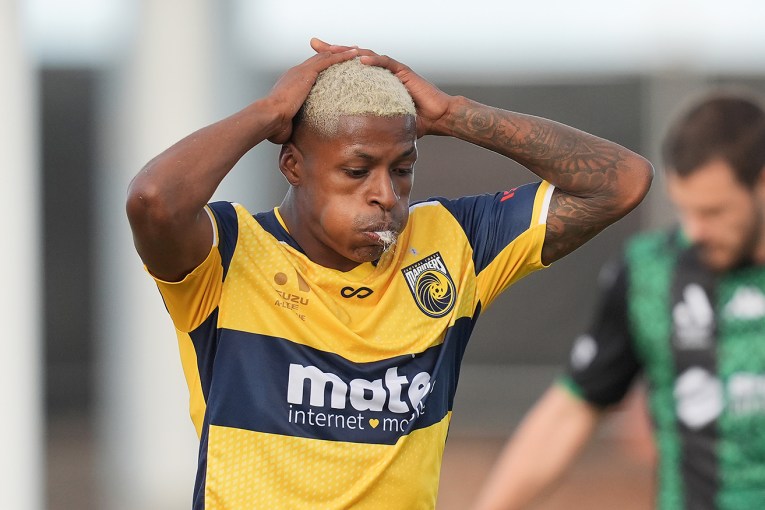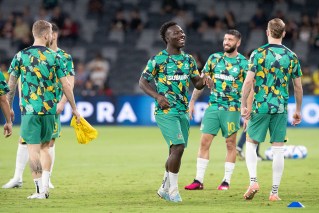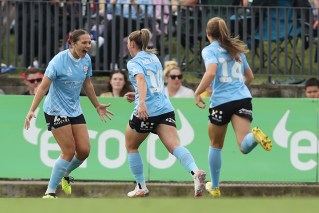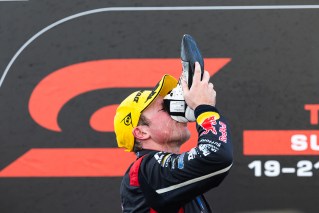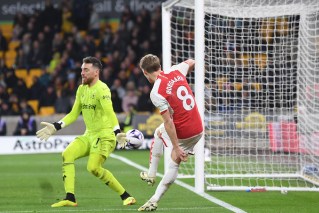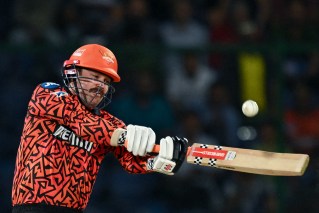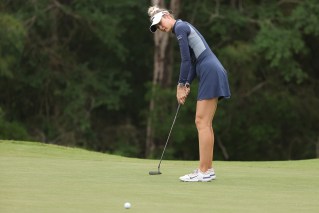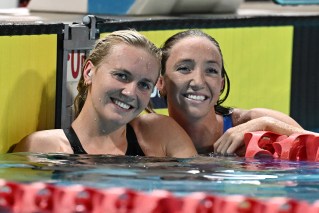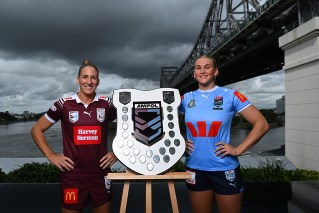Linda Pearce: No-excuses Barty wins with graceful exit, as business end begins

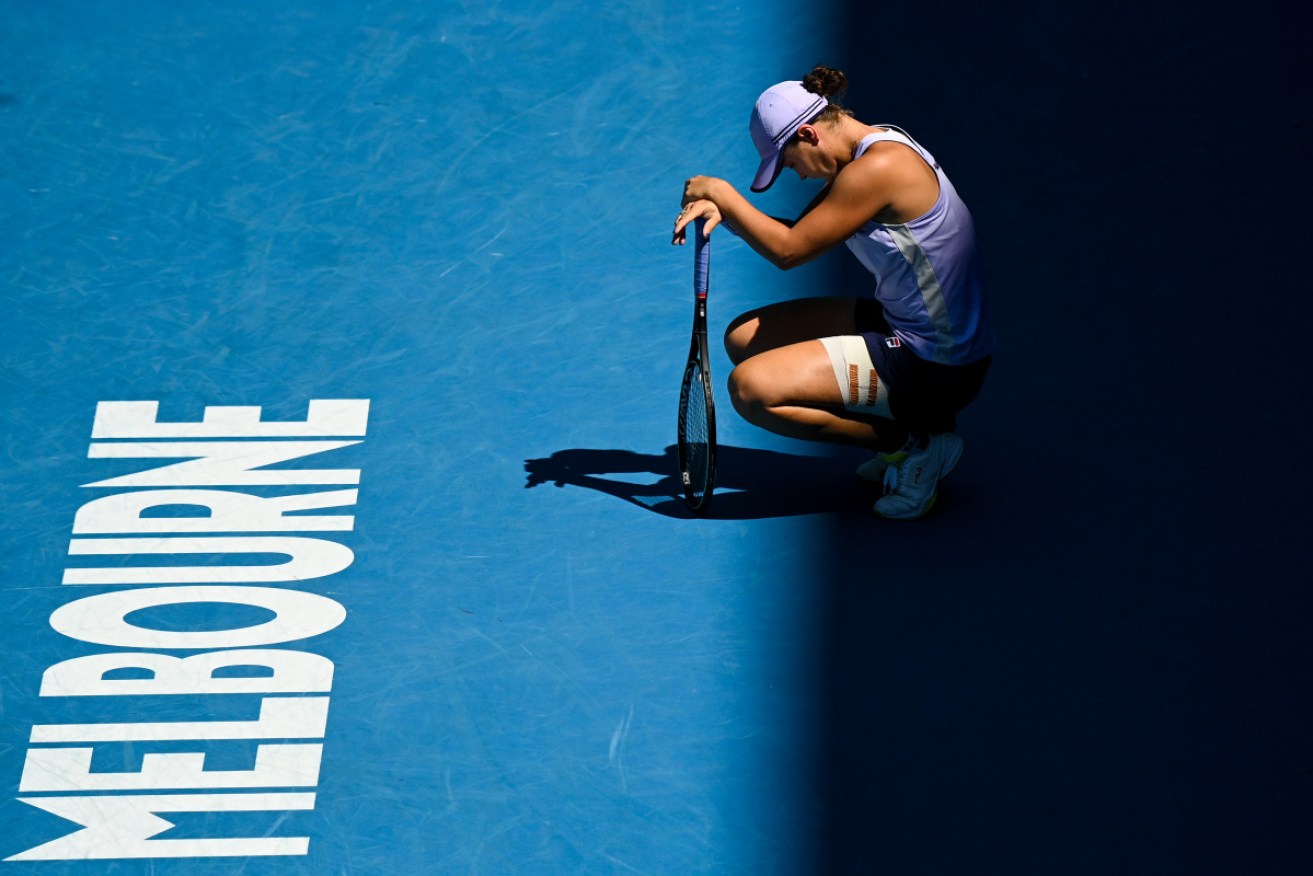
Ash Barty waits for Karolina Muchova to return from a medical time out on Wednesday. Photo: AAP
Ash Barty does not have a Kyrgiosian familiarity with criticism, and hence the sting in the disapproval she received for bringing her baby niece into the Australian Open interview room after her semi-final loss in 2020.
Yet there could only be praise for the way Barty handled Wednesday’s crushing defeat to Karolina Muchova. Classy. Responsibility accepted as a non-controversy was rightly hosed down.
Which is not to underestimate the raw disappointment the No.1 seed was feeling after a 1-6 6-3 6-2 quarter-final elimination on her home court by the 25th seed.
Amid confirmation of the end of Victoria’s snap lockdown, limited ticket sales reopened for a semi against a low-profile American (Jennifer Brady, a three-set winner over Jessica Pegula) in which Barty was widely tipped to be the star drawcard.
Next stop: semifinals ✅@jennifurbrady95 dropped the first, recovered, then never looked back!
Brady defeats Pegula 4-6 6-2 6-1 👏#AusOpen | #AO2021 pic.twitter.com/7s22WrT6Z2
— #AusOpen (@AustralianOpen) February 17, 2021
Instead, Australia’s Open singles drought will stretch into a 43rd year, and either first-timer Muchova or Brady, the 22nd seed and last survivor of hard hotel quarantine lockdown, will duel for the title against the winner of Thursday’s all-star semi between US Open champion Naomi Osaka and an ominous-looking Serena Williams, who is on the march for a record-equalling 24th major.
No one is questioning how drastically Barty’s match against Muchova was altered by the 10-minute medical timeout the Czech took while down a set and a break.
The before-and-after numbers reveal all, with Muchova finding her missing mojo during 10 minutes of shaded rest and ice treatment, after which the thumb-twiddling favourite’s previously precise and commanding level fell into untidy disarray.
It was when Muchova admitted that the cause was not a pre-existing abdominal problem, but a bout of heat-induced dizziness – “I was a bit lost on the court and my head was spinning so I took a break” – that fingers were pointed.
“Legally fine but ethically icky”, said Barty’s friend Casey Dellacqua on Nine.

The medical timeout helped Karolina Muchova regain her mojo. Photo: AP
Completely legitimate, in fact, and while the long delay in the flat atmosphere of a near-empty Rod Laver Arena changed the match, there were several factors that decided it.
Having been unable to regain the lost momentum and rhythm, Barty graciously refused to bite on the sour grape opportunity served up by reporters multiple times.
“She’s within her rights to take that time. If she wasn’t within the rules, the physios and the doctors would have said so. That’s the laws of our game, is that we have those medical timeouts for cases that are needed. Obviously she needed that today,” said Barty, stressing she does not write the rules, just abides by them.
“From my point of view, I’ve played a lot of matches where there have been medical timeouts.
I’ve taken medical timeouts myself before, so that shouldn’t be a massive turning point in the match. I was disappointed that I let that become a turning point. I’m experienced enough now to be able to deal with that.”
Just what form the tour will take if and when Barty resumes on it is a far more vexed question than what constitutes acceptable grounds for treatment.
Crunch time appears to be approaching as to what is sustainable in terms of travel and quarantine on the WTA and ATP Tours, given the physical and emotional wellbeing issues involved with moving around in a pandemic.
Both Novak Djokovic and Alexander Zverev were outspoken in that regard, with one suggestion for NBA-style hubs, and/or multiple events in a central location over successive weeks, but agreement that a travelling circuit is too difficult in the current circumstances.
Barty, who chose to sit out the balance of 2020 in Queensland after the tour resumed in July, confirmed that her preference was still to compete in Doha and Dubai next month ahead of what, by necessity, will probably be many more months away.
Chin up, and focused on the positives no matter the result.
👏 @ashbarty #AusOpen | #AO2021 pic.twitter.com/SW8jXpjk7g
— #AusOpen (@AustralianOpen) February 17, 2021
“Obviously it’s the first time we’ve looked to travel for quite some time now,” she said. “We’ll sit back and kind of go through all of the health risks that are at this stage and to where we’re going, then we just work from there.”
With plenty to think about in the meantime, according to Barty.
Asked where the loss sat among her most difficult, Barty said: “Yeah, it’s heartbreaking, of course. But will it deter me? Will it ruin the fact we’ve had a really successful start to our season? Absolutely not. The sun will come up tomorrow. We go about our work again.
“You’re either winning or you’re learning. I think today is a massive learning curve for me, for Tyz (coach Craig Tyzzer), my team as well. We take the positives out of it, without doubt and don’t let this particular match, this particular hour of tennis, deter us from what we’re trying to do.”
As the temperature rose further on RLA, fourth seed Daniil Medvedev won the all-Russian quarter-final against his friend Andrey Rublev in entertaining straight sets and just before cramp set in.
"If we have a Russian final it's just going to be a dream come true but we are going to have tough matches" @DaniilMedwed and @AsKaratsev ensure two Russian men are through to the #AusOpen semifinals for the very first time! 🇷🇺🇷🇺#AO2021 pic.twitter.com/kz8HXFUeqy
— #AusOpen (@AustralianOpen) February 17, 2021
A historic all-Russian men’s final is still possible though it is a long shot.
Just about the only thing Djokovic (17 slams among 81 career titles, $188 million in official prize money, 8.7 million Twitter followers) and debutant qualifier Aslan Karatsev (zero titles, $797,400 prize money about to be more than doubles and just over 2000 twitterers) have in common is a shared appointment in a semi-final that absolutely no one saw coming.
Not because of the world No.1, obviously, because Djokovic has won the title on each of the eight previous times he has gone this far.
Even the Serb admits he first saw Karatsev play only last week, when the world No.114 started this astonishing run to become the first man in the Open era to reach the semis on his major debut.
The last of his three top-20 victims was a wounded Grigor Dimitrov. In the quarter-final where this crazy tale was expected to come to a predictable end. Except it didn’t. So here he still is. Remarkable.

A relieved Novak Djokovic after defeating Alexander Zverev on Tuesday night. Photo: AAP
The 27-year-old was born in the industrial town of Vladikavkaz, lived in Israel with his family from the ages of three to 12, moved back to Russia until he was 18, then to Germany with the help of a sponsor, to Spain, and is now based in Belarus with coach and career saviour Yahor Yatsyk. Safe to say that within one match of a grand slam final is not where he expected to wake up this morning.
“He impressed me, impressed a lot of people,” said Djokovic. “His movement, his firepower from baseline. Flat backhand, Russian school, great backhand. Looks to run around. Also hits some good forehands, dictate the play … He’s there for a reason, and (I) congratulate him for great success.”
Djokovic was not about to overplay the romance of the Karatsev story, though, keen to stress the unprecedented challenges involved in riding his own “rollercoaster” since suffering an abdominal injury midway through Friday night’s trans-lockdown five-setter against Taylor Fritz.
Crowds will be back again tonight, capped at half-capacity (7477) for the last five sessions, but one suspects plenty of support for the outsider against the incumbent, who is prioritising his recovery by not practising on his off days.
“I have not ever experienced that, to be honest, and I have never experienced this kind of injury during a grand slam and kind of kept going,” said Djokovic, who added he felt better from the second set onwards against Zverev in a tight four-setter than he had since the apparent muscle tear occurred.
"I gotta keep going."@serenawilliams focus is next level. #AusOpen | #AO2021 pic.twitter.com/hbbn01yhzO
— #AusOpen (@AustralianOpen) February 16, 2021
Williams-Osaka is scheduled first, in the pair’s first grand slam match since the controversial 2018 US Open final won by Osaka, with the American saying of their subsequent relationship: “I think we both have had closure, and we have reached out to each other. I have definitely reached out. Off the court, it’s hard. I think she’s a great competitor and she’s a cool cat.’’ Said with a smile.
The more introverted but utterly charming Osaka admits she grew up watching 39-year-old Serena, who is “someone that I feel really intimidated when I see her on the other side of the court”.
Fact 👇
Every time @naomiosaka has reached the semifinals at a Slam, she has gone on to win the 🏆#AusOpen | #AO2021
— #AusOpen (@AustralianOpen) February 16, 2021
No place for that on Thursday, when fans return in moderate but welcome numbers, and there are three semi-finals to be played and won.
Back in Brisbane, Barty could be forgiven for not watching.
She will be back, though. Her day will come.
